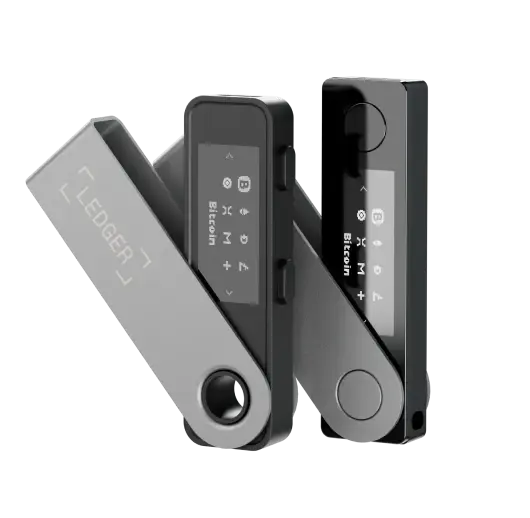Compare Ledger wallets
Get a Ledger Nano
Select and purchase a Ledger hardware wallet of your choice.
- Beginner in the crypto world? Get started with Ledger Nano S Plus.
- Prefer a Bluetooth connection? Try with Ledger Nano X.
Looking for a DigiByte Wallet to buy and store your DigiByte? Join 7+ million customers who trust Ledger hardware wallets to securely store their crypto and use them on the day-to-day basis.
Trusted by over 7 million customers

Whether you’re looking to keep your crypto safe for long-term or manage them on a daily basis, Ledger has the right product for you.
Ledger hardware wallet
Ledger hardware wallet stores your private keys and signs transactions offline, making them resistant to malicious attacks and threats. Pair the Ledger crypto wallet with Ledger Live App to manage your DigiByte on the go.
Ledger Live App
Ledger Live App is a gateway to manage your assets, checking your real-time balance, tracking transaction histories, and more.

Select and purchase a Ledger hardware wallet of your choice.

Download and install the Ledger Live app in a couple of clicks on desktop and mobile.
Coupled with a Ledger, it makes the most secured wallet for your DigiByte.

Add a DigiByte account with a couple of clicks. Choose among different providers and easily manage your DigiByte.
And not only DigiByte. With Ledger Live, you can manage thousands of crypto and a large variety of NFTs.

The most premium secure touchscreen hardware wallet to protect and manage your DigiByte.

Designed with accessible sizing, enjoy the all new secure touchscreen user experience to manage your DigiByte.

Our classic entry-level hardware wallets built with all the essentials to secure your DigiByte.

With Ledger Live coupled with a Ledger, you can:
*Buy, send/receive, swap, stake, and other crypto transaction services are provided by third-parties provider, which availability may vary based on jurisdiction/territory.

Swapping allows you to explore different crypto assets, protect your DigiByte from volatility, and diversify your portfolio.
You can easily swap DigiByte through Ledger Live without using fiat currencies.

DigiByte (DGB) is a platform for creating assets and an open source blockchain. It was created in October 2013, and in January 2014, the first block of its DGB token was mined as a fork of Bitcoin (BTC).
DigiByte has been in existence for a long time as a public blockchain and cryptocurrency. To enhance security, it employs five different algorithms, and its original goal was to improve on the security, capacity, and transaction speed of the Bitcoin blockchain.
DigiByte is made up of three layers, which include a public ledger, a smart contract “App Store,” and the core protocol, with nodes that communicate to transmit transactions.
Find answers to some of the most common questions.
Related Resources